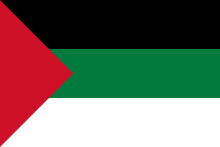| Revision as of 22:48, 4 May 2014 editOmar-toons (talk | contribs)5,164 edits →Former flags with the Pan-Arab colors← Previous edit | Revision as of 23:08, 4 May 2014 edit undoAnomieBOT (talk | contribs)Bots6,581,040 editsm Dating maintenance tags: {{Citation needed}}Next edit → | ||
| Line 2: | Line 2: | ||
| ]]] | ]]] | ||
| , crwflags.com</ref>]] | , crwflags.com</ref>]] | ||
| The '''Pan-Arab colors''' are ], ], ] and ]. Individually, they have their origins in the flags of prominent empires and dynasties in ] history{{citation needed}}. They are combined according to two sub-sets: the Arab Revolt colors, coming from the 1916 ], and the Arab Libertation colors, in which green is less significant.{{citation needed|date=October 2013}} | The '''Pan-Arab colors''' are ], ], ] and ]. Individually, they have their origins in the flags of prominent empires and dynasties in ] history{{citation needed|date=May 2014}}. They are combined according to two sub-sets: the Arab Revolt colors, coming from the 1916 ], and the Arab Libertation colors, in which green is less significant.{{citation needed|date=October 2013}} | ||
| Each of the four Pan-Arab colors were intended to represent a certain Arab dynasty, or era.<ref>'''Abū Khaldūn ]''', ''The days of Maysalūn: A Page from the Modern History of the Arabs'', Sidney Glauser Trans., (Washington D.C.: Middle East Institute, 1966), 46.</ref> The black was the color of the ]; white was used by the ] Caliphate; green was used by the ] Caliphate; and red was the flag held by the ].<ref>Mahdi Abdul-Hadi, , passia.org</ref> | Each of the four Pan-Arab colors were intended to represent a certain Arab dynasty, or era.<ref>'''Abū Khaldūn ]''', ''The days of Maysalūn: A Page from the Modern History of the Arabs'', Sidney Glauser Trans., (Washington D.C.: Middle East Institute, 1966), 46.</ref> The black was the color of the ]; white was used by the ] Caliphate; green was used by the ] Caliphate; and red was the flag held by the ].<ref>Mahdi Abdul-Hadi, , passia.org</ref> | ||
Revision as of 23:08, 4 May 2014
| This article needs additional citations for verification. Please help improve this article by adding citations to reliable sources. Unsourced material may be challenged and removed. Find sources: "Pan-Arab colors" – news · newspapers · books · scholar · JSTOR (August 2009) (Learn how and when to remove this message) |


The Pan-Arab colors are black, white, green and red. Individually, they have their origins in the flags of prominent empires and dynasties in Arab history. They are combined according to two sub-sets: the Arab Revolt colors, coming from the 1916 Arab Revolt flag, and the Arab Libertation colors, in which green is less significant.
Each of the four Pan-Arab colors were intended to represent a certain Arab dynasty, or era. The black was the color of the banner of Muhammad; white was used by the Umayyad Caliphate; green was used by the Fatimid Caliphate; and red was the flag held by the Khawarij.
The Arab Revolt colors are used currently in the flags of Jordan, Kuwait, Palestine, the SADR, and the United Arab Emirates. The Arab Liberation colors appear in the flags of Egypt, Iraq, Sudan, Syria, and Yemen. Formerly, Pan-Arab colors were shown in the flag of Libya as well as in flags of the short-lived United Arab Republic, Arab Federation and Federation of Arab Republics.
Current flags with Pan-Arab colors
Sovereign states
Partially recognized states
Unrecognized territories
Former flags with the Pan-Arab colors
-

Federation of Arab Republics (Egypt (1972–1984), Syria (1972–1980), and Libya (1972–1977)) -

Libya (1969–1972) -

Egypt (1952-1958) -

Iraq (1921–1959) -

Arab Federation (1958) -

Iraq (1959–1963) -

Iraq (1963–1991) and Syria (1963–1972) -

Iraq (1991–2004) -
 Syria (1920-03-08 to 1920-07-24)
Syria (1920-03-08 to 1920-07-24) -

Syria (1932–1958 and 1961–1963) -

United Arab Republic (1958–1961) -

North Yemen (1962–1990) -

South Yemen (1967–1990) -
 Arab Islamic Republic (1974)
Arab Islamic Republic (1974)
-
 Hejaz (1917–1920)
Hejaz (1917–1920)
-
 Hejaz (1920–1926)
Hejaz (1920–1926)
-
 Hejaz (1926–1932)
Hejaz (1926–1932)
Former Arab flags
-

Rashidun Caliphate
(632–661) -

Umayyads
(661–750) -

Abbasids
(750–1258) -

Fatimids
(909–1171) -

Ayyubids
(1171–1341) -

Mamluk Sultanate
(1250–1517)
See also
References
- ^ Pan-Arab Colours, crwflags.com
- Abū Khaldūn Sati' al-Husri, The days of Maysalūn: A Page from the Modern History of the Arabs, Sidney Glauser Trans., (Washington D.C.: Middle East Institute, 1966), 46.
- Mahdi Abdul-Hadi, Palestine Facts: The Meaning of the Flag, passia.org
External links
- Pan-Arab colors
- Evolution of the Arab Flag, by Dr. Mahdi Abdul-Hadi (in Arabic)









